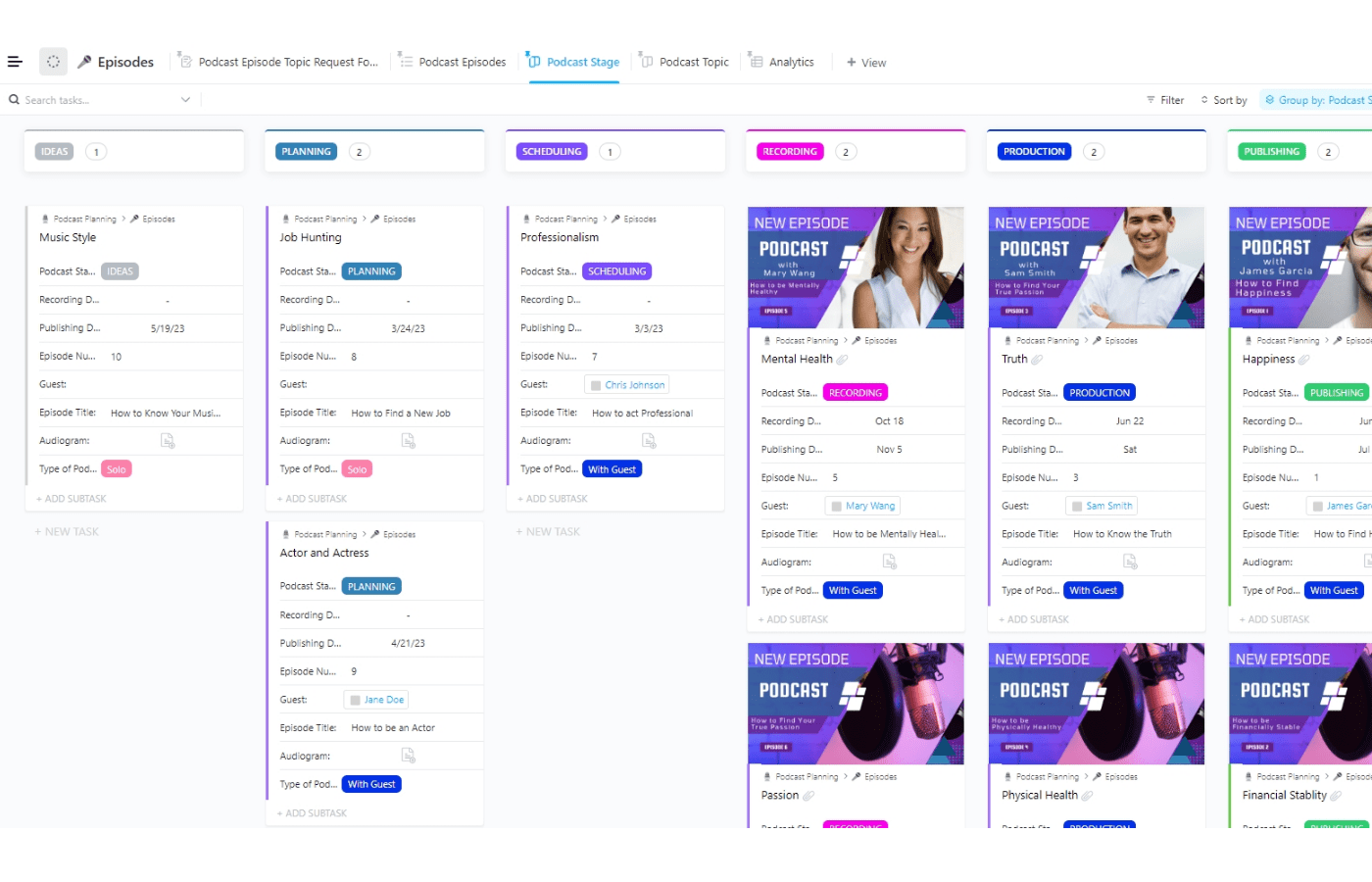Key takeaways
Business process management and project management are two project management concepts that are often confused. While interconnected, the two have distinct differences that separate one from the other. Read on to learn more about the differences between business process management vs project management.
What is Business Process Management (BPM)?
Business process management (BPM) is a discipline that focuses on discovering, modeling, analyzing, and optimizing business processes to enhance organizational efficiency. A business process coordinates the behavior of people, systems, information, and resources to produce outcomes that support business strategy. Common examples include order fulfillment, account updates, invoice approvals, and employee onboarding.
Key features of business processes include clear objectives, defined inputs and outputs, specific activities or tasks, allocated resources and responsibilities, and established controls and time frames. Two common frameworks used in BPM are Six Sigma and Lean principles, which provide structured approaches to process improvement and waste reduction.
What is Project Management (PM)?
Project management processes are essential procedures that enable project teams to collaborate and coordinate effectively throughout the duration of their projects. These processes are designed to help teams meet their objectives and produce project deliverables that are up to standards.
The core components of project management processes include task management, schedule management, and resource management. These elements work together to ensure that project activities are organized, timelines are adhered to, and resources are allocated optimally. Additionally, these processes facilitate collaboration and communication among stakeholders, maintaining consistent progress tracking and highlighting accountability throughout the project lifecycle.
Several common frameworks are employed in project management, each offering unique approaches to organizing and executing projects. Among the most popular are Agile Scrum, which emphasizes flexibility and iterative development; Waterfall, which follows a linear, sequential approach; and PRINCE2 (PRojects IN Controlled Environments), a structured method for effective project management. These frameworks provide structured methodologies that can be adapted to various project types and organizational needs, helping teams navigate the complexities of project execution and delivery.
Key Differences: Business Process Management vs Project Management
Business process management and project management are different in a lot of aspects including scope and relevance, among other things. Here’s a summary of these differences.
Business Process Management
Project Management
Scope
Processes for the ongoing operations of a business
Focused on projects that are time-bound initiatives that aim to deliver a specific product, service, or results
Relevance
Continually relevant
Only when projects arise
Key Elements
- Process objectives
- Input and output
- Activities or tasks
- Resources and responsibilities
- Controls and time frame
- Task management
- Schedule management
- Resource management
- Collaboration and communication for stakeholders
- Consistent progress and tracking
- Considers the project lifecycle
- Highlights accountability
Framework Examples
- Six Sigma
- Lean principles
- Agile Scrum
- Waterfall
- Prince2
While business processes are continually relevant to facilitate an organization’s existence and operations, project management processes are only necessary when specific projects arise within a company. This fundamental distinction highlights the ongoing nature of BPM versus the temporary, goal-oriented nature of project management.
Project management processes and business processes are interconnected and complementary aspects of organizational operations. While robust business project management processes enable organizations to execute focused, time-bound endeavors efficiently, they are supported and facilitated by well-established business processes.
When to Use Each
Business process management examples
Real estate sales pipeline
Using a customer relationship management (CRM) system to unify contacts, automate emails, and create templated forms is an example of effective business process management in sales. By unifying contacts, a real estate company can create a single source of truth for customer data, accessible across departments. CRMs can also provide automated emails that can expedite communication processes. This would allow the team to save time and ensure consistent touch-bases for various customer interactions such as welcome emails, follow-ups, and promotional offers.
Content creation and approvals
Content creation and approval pipelines are excellent examples of BPM in action, particularly when they incorporate automated approvals and notifications. This process streamlines the workflow of creating, reviewing, and publishing content, ensuring efficiency, consistency, and quality control throughout the organization. By implementing such a system, companies can significantly reduce bottlenecks, minimize errors, and accelerate the content production cycle.
Employee onboarding
Employee onboarding through the creation of training videos and validation tests is another good example of business process management that streamlines and standardizes the integration of new hires into an organization. This approach replaces traditional manual training methods with a more efficient, consistent, and scalable process. By implementing this system, companies can ensure that all new employees receive the same high-quality information, regardless of when they join or who conducts their orientation.
Project management examples
Software development
Software development using agile Scrum methodology is an exemplary case of effective project management processes and frameworks. In this scenario, a cross-functional team collaborates to develop a new application, leveraging the iterative and flexible nature of agile Scrum to navigate the complex landscape of software creation. This approach embodies key project management principles including clear goal-setting, efficient resource allocation, and continuous progress tracking.
Event management
Event management for a product launch and media event using a hybrid project management framework is also a good example of when project management processes are effectively applied. This approach combines elements from different methodologies to create a tailored system that addresses the unique challenges of event planning and execution.
In this scenario, the events team might utilize a combination of traditional waterfall planning for long-term, sequential tasks and agile principles for more dynamic, adaptable elements. The initial stages of event planning, such as venue selection, budget allocation, and overall timeline creation, would follow a more linear waterfall approach. This allows for clear milestones and deadlines to be established early on, ensuring that foundational elements are in place.
Simultaneously, the team could employ agile-inspired sprints for tasks that require more flexibility, such as developing the event program, coordinating with speakers or performers, and managing marketing materials.
System migration
A system migration, such as an IT team facilitating a growing company’s transition to Google Workspace (formerly G Suite), can be another situation of when project management processes are crucial. This type of project requires careful planning, coordination, and execution to ensure minimal disruption to the company’s operations while maximizing the benefits of the new system.
The project management process for this migration would typically begin with a thorough assessment of the current email system and the company’s needs. The IT team would create a detailed project plan, including a timeline, resource allocation, and risk assessment. They would likely use a combination of traditional project management techniques and agile methodologies to handle both the predictable and unpredictable aspects of the migration. For instance, they might use a Gantt chart to outline the overall project timeline, while also incorporating sprint-like phases for specific tasks such as data migration, user training, and troubleshooting.
By applying project management principles, the IT team can ensure that the migration is completed efficiently, on time, and within budget, while also minimizing downtime and maximizing user adoption of the new Google Workspace system. This structured approach demonstrates how project management processes are essential in guiding complex technological transitions and ensuring their success.
Tools for Business Process Management and Project Management
Business process management tools
Business process management software tools are comprehensive solutions that orchestrate and optimize complex business processes across an organization. These tools facilitate the creation, monitoring, and adaptation of workflows spanning various departments and locations.
By leveraging advanced analytics, activity tracking, and decision management features, BPM suites effectively synchronize people, systems, and resources to achieve specific business goals. Their ability to streamline operations and drive digital transformation initiatives makes them essential for organizations aiming to enhance efficiency and adaptability in dynamic business environments.
Project management tools
Project management tools are comprehensive software solutions designed to streamline and enhance various aspects of project execution. These tools typically offer a range of functionalities including task planning, schedule management, resource management, collaboration and communication features, and file management capabilities. By integrating these functions, PM tools enable project managers and teams to efficiently plan, execute, and monitor projects, ultimately improving productivity and project outcomes.
FAQs
Conclusion: Business Process Management vs Project Management
While business process management focuses on the ongoing analysis and improvement of a company’s operational processes, project management processes are specifically designed to enhance efficiency and collaboration in temporary endeavors.
Project managers must possess a thorough understanding of their organization’s business processes. This knowledge enables them to generate accurate estimates and ensure the seamless execution of projects within the broader context of the company’s operations.
By bridging the gap between overarching business processes and project-specific workflows, project managers play a vital role in aligning temporary initiatives with long-term organizational goals and efficiency.





